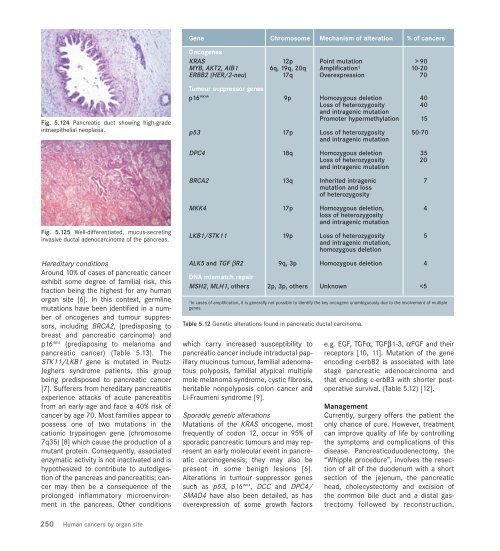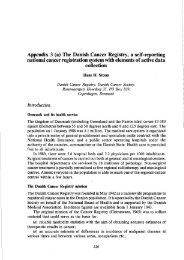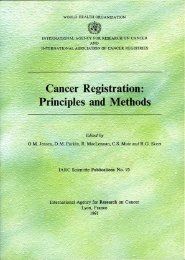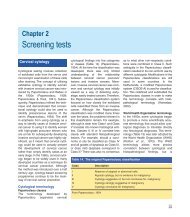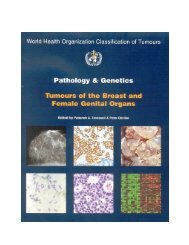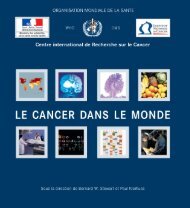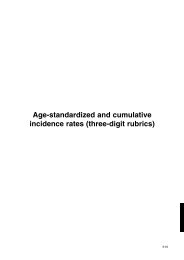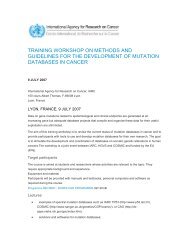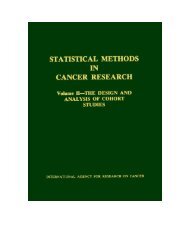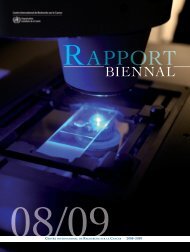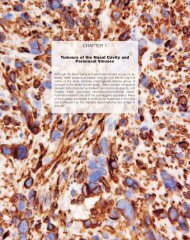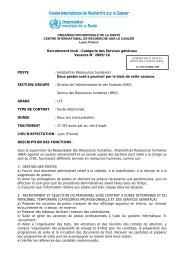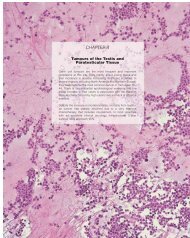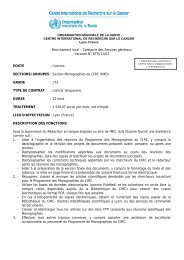world cancer report - iarc
world cancer report - iarc
world cancer report - iarc
Create successful ePaper yourself
Turn your PDF publications into a flip-book with our unique Google optimized e-Paper software.
Fig. 5.124 Pancreatic duct showing high-grade<br />
intraepithelial neoplasia.<br />
Fig. 5.125 Well-differentiated, mucus-secreting<br />
invasive ductal adenocarcinoma of the pancreas.<br />
Hereditary conditions<br />
Around 10% of cases of pancreatic <strong>cancer</strong><br />
exhibit some degree of familial risk, this<br />
fraction being the highest for any human<br />
organ site [6]. In this context, germline<br />
mutations have been identified in a number<br />
of oncogenes and tumour suppressors,<br />
including BRCA2, (predisposing to<br />
breast and pancreatic carcinoma) and<br />
p16 INK4 (predisposing to melanoma and<br />
pancreatic <strong>cancer</strong>) (Table 5.13). The<br />
STK11/LKB1 gene is mutated in Peutz-<br />
Jeghers syndrome patients, this group<br />
being predisposed to pancreatic <strong>cancer</strong><br />
[7]. Sufferers from hereditary pancreatitis<br />
experience attacks of acute pancreatitis<br />
from an early age and face a 40% risk of<br />
<strong>cancer</strong> by age 70. Most families appear to<br />
possess one of two mutations in the<br />
cationic trypsinogen gene (chromosome<br />
7q35) [8] which cause the production of a<br />
mutant protein. Consequently, associated<br />
enzymatic activity is not inactivated and is<br />
hypothesized to contribute to autodigestion<br />
of the pancreas and pancreatitis; <strong>cancer</strong><br />
may then be a consequence of the<br />
prolonged inflammatory microenvironment<br />
in the pancreas. Other conditions<br />
250 Human <strong>cancer</strong>s by organ site<br />
Gene Chromosome Mechanism of alteration % of <strong>cancer</strong>s<br />
Oncogenes<br />
KRAS 12p Point mutation > 90<br />
MYB, AKT2, AIB1 6q, 19q, 20q Amplification 1 10-20<br />
ERBB2 (HER/2-neu) 17q Overexpression 70<br />
Tumour suppressor genes<br />
p16 INK4A 9p Homozygous deletion 40<br />
Loss of heterozygosity 40<br />
and intragenic mutation<br />
Promoter hypermethylation 15<br />
p53 17p Loss of heterozygosity 50-70<br />
and intragenic mutation<br />
DPC4 18q Homozygous deletion 35<br />
Loss of heterozygosity 20<br />
and intragenic mutation<br />
BRCA2 13q Inherited intragenic 7<br />
mutation and loss<br />
of heterozygosity<br />
MKK4 17p Homozygous deletion, 4<br />
loss of heterozygosity<br />
and intragenic mutation<br />
LKB1/STK11 19p Loss of heterozygosity 5<br />
and intragenic mutation,<br />
homozygous deletion<br />
ALK5 and TGF βR2 9q, 3p Homozygous deletion 4<br />
DNA mismatch repair<br />
MSH2, MLH1, others 2p, 3p, others Unknown


